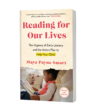Fact: fiction is good for you. So, while it may be tempting to see nonfiction as a somehow more “useful” reading choice, if your child makes a beeline for tales, fables, and all things kid lit (as my four-year-old has done from the get-go), rest easy. Put any worries over fiction vs nonfiction to one side, and instead look for a mix of books that interest your child. One of the best things a parent can do to motivate their child’s learning and development is to follow their reading interests, no matter the format.
What’s more, there are some great reasons why kids should read fiction. Science is now backing up what story lovers have long held true—that fiction brings a host of benefits to readers. Not only does it appear to spark joy, help with relaxation, broaden horizons, and deepen focus, but researchers are discovering that it has an important role to play in other areas too.
Fiction nurtures emotional intelligence, open-mindedness, and altruism
Can reading literature really foster empathy and open minds? Yes, according to a wealth of research over the last two decades. A high “EQ,” or emotional intelligence, is a crucial element of general intelligence, and a key predictor for thriving in life—as highlighted by psychologists John Mayer, Peter Salovey, and Daniel Goleman. It’s as important as IQ, if not more so. And one of the benefits of reading fiction is its positive effect on personal growth and EQ. Studies have shown it fosters:
- Theory of mind—the ability to think about the mental states of others, as well as our own
- Empathy—the capacity to understand and share another’s feelings
- Social cognition—the ability to interpret social information and use it to guide behavior
- Open-mindedness—an attitude necessary for both reasoning and creativity, and a characteristic of high EQ
- Altruism—for example, fiction readers are nearly three times more likely to volunteer than non-readers, independent of education level, age, gender, or ethnicity
Stories are training for real life
Keith Oatley, professor emeritus of cognitive psychology at the University of Toronto, has dug deep into how reading fiction—and the exercise in relating to the perspectives of characters it encourages—can act as a kind of training for real life, specifically our social world.
In his words, fiction is a “particularly useful simulation because negotiating the social world effectively is extremely tricky, requiring us to weigh up myriad interacting instances of cause and effect. Just as computer simulations can help us get to grips with complex problems such as flying … so novels, stories, and dramas can help us understand the complexities of social life.”
Give children access to fiction books, and you can help them learn nuanced lessons about how our societies and communities work.
Literature stimulates language learning
Curious to know what’s going on in your (or your child’s) brain when you read fictional stories?
Researchers in one study took functional MRI scans of several fiction readers’ brains. One finding was that even on the mornings after reading, brain activity was heightened in the left temporal cortex, an area associated with receptivity for language. According to neuroscientist Gregory Berns, such heightened brain connectivity is what experts call “‘shadow activity,’ almost like a muscle memory.”
A 2021 study on reading for pleasure also found that people who read fiction, regardless of its perceived “quality,” have better verbal abilities than those who don’t. If one of the possible benefits of reading fiction—any kind of fiction—is that it flexes the language “muscle,” let’s follow our kids’ interests and give them plenty of room to flex!
Narratives boost comprehension and problem-solving
A skill called “sequencing” is another great argument in favor of why kids should read fiction. Sequencing is being able to identify, organize, and re-tell the order in which events happen, e.g. the beginning, middle, and end of a narrative—and having a good handle on it is a key reading comprehension skill.
Beyond reading, it also plays a huge part in the “step-by-step” of our daily activities, from morning routines to following recipes. Being able to understand and organize information logically through sequencing aids problem-solving across subjects, from math to history, too. So it stands to reason that reading, listening to, and talking about stories (as well as narrative nonfiction) are brilliant ways to strengthen this vital skill.
Tales supercharge reading skills
According to some literacy research, the mix of what a person reads can make a difference to their skills. A study of over 250,000 teenagers’ reading habits across 35 countries found that those who read fiction several times a week had reading scores almost six months ahead of those who rarely or never read fiction.
And this “fiction effect” on reading proficiency held true even when other factors had been taken into account, such as the fact that fiction readers tend to spend more time reading than nonfiction readers. While reading nonfiction also has demonstrable benefits, it’s great to know that stories can be so powerful for developing excellent literacy.
The bottom line: Don’t frame your family reading choices as “fiction vs nonfiction,” but rather as “fiction and nonfiction.” All informed by your child’s personal interests and inclinations.
Are your kids fiction fans? What kinds of stories do they pick out? And what benefits of reading fiction have you noticed?


